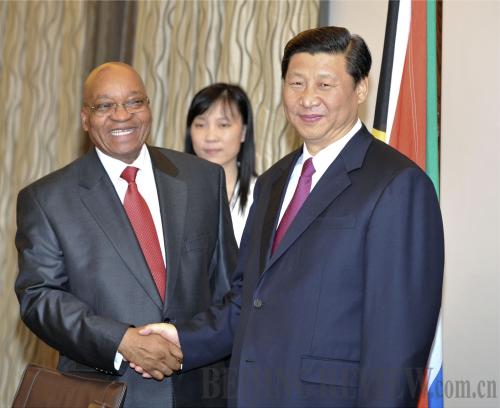|
 |
|
LOOKING AHEAD: Chinese Vice President Xi Jinping meets with South African President Jacob Zuma in Cape Town on November 17 (HUANG JINGWEN) |
China-Africa trade has realized an annual growth rate of over 30 percent, increasing from $10.6 billion in 2000 to $106.8 billion in 2008.
Latest statistics show the trade figure for the first three quarters of this year reached $93.7 billion, up 48 percent from the same period last year. In 2009, the bilateral trade was influenced by the financial crisis and decreased.
China is Africa's top trading partner, while Africa is China's fourth largest overseas investment destination.
Future trends
"South-South cooperation has brighter prospects and greater development potential in the post-financial crisis era," He said.
She said energy cooperation was the centerpiece of China-Africa cooperation in the past. But in the future, the two sides will pay more attention to agricultural, technological, clean energy, human resource and infrastructure cooperation. China and Africa will do more to implement the agreed documents and realize win-win results, she said.
The two sides should make further efforts to deal with trade imbalances between them and must find ways to perfect the trade structure, she said. China and African countries should also enhance exchanges among people by means such as personnel training.
Nearly 30,000 African professionals in various sectors have received training by China, and in 2009 alone, more than 12,000 African students were studying in China.
Africa's exports to China have doubled during the past 10 years, with Angola accounting for 34 percent of African exports to China. The China-Angola trade volume in the first quarter of this year reached $6.31 billion, increasing 144.4 percent year on year. China imports oil from Angola, and exports machinery, construction materials and textiles to the country.
Li from the CICIR said China has been playing an important role in Angola's reconstruction since its civil war ended in 2002, and there are currently 80,000 to 100,000 Chinese workers in the country's infrastructure, agriculture and mining industries. China has also afforded technical and financial assistance to Angola.
Li said the two sides can increase cooperation on a larger scale. For example, they can deepen cooperation in agriculture, telecommunications and tourism. "Such cooperation helps not only promote local social development, but also maintain Chinese enterprises' sustainable development in the country," said Li.
Vice President Xi also said bilateral cooperation should be expanded to new areas and brought to higher levels. He said the two sides should increase the scale of bilateral trade, while optimizing the trade structure.
China will cooperate with Africa in infrastructure construction, actively explore cooperation on transnational projects, promote the export of African goods to China, facilitate investment and technology transfers to Africa, provide job opportunities for the African people and enhance African countries' development capacities, in order to benefit the African people.
Moreover, China will continue to do its best to increase assistance to Africa, optimize the structure of assistance, and focus assistance projects on education, agriculture, health, poverty reduction, as well as energy conservation and environmental protection.
By the end of 2009, China had canceled more than 300 loans owed by 35 of the most heavily-indebted, needy and least developed countries in Africa.
China's investment to Africa has continued to increase during the past decade. In 2009, China's direct investment in Africa stood at $1.44 billion, a nearly six-fold increase from 2000. The average annual growth of China's investment in Africa during the past 10 years exceeded 46 percent.
Now China has invested in 4,000 programs in African countries, in fields such as agriculture, mining, processing, infrastructure and trade. There are about 2,000 Chinese-invested enterprises in Africa.
As more Chinese companies and business people conduct cooperation and investment in Africa, they will have to pay more attention to their social image and take on greater responsibility for local development, He Wenping said.
| 